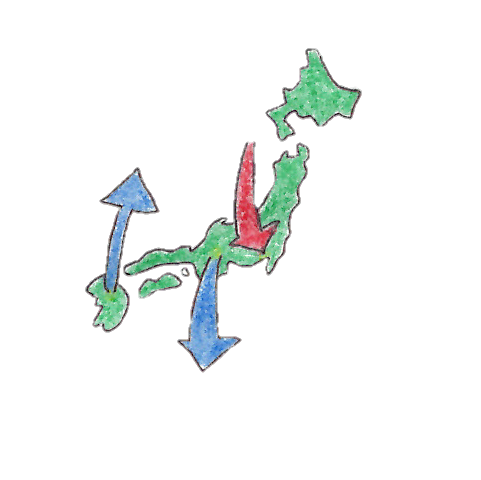Over The Sea : Standard in Foreign Countries
Standard in Foreign Countries 
It was 37% that food self-sufficiency rate in Japan in 2018 was.
That said, we often see foreign vegetables or flutes at supermarkets.
How they use agrochemicals to cultivate crops?
Let’s focus on three perspectives.
・Regulation of residual agrichemicals
・Institution of imported crops in Japan
・ About postharvest
Regulation of residual agrichemicals
When the agency decides residue standards, they use acceptable daily intake (ADI) as a reference.
There is little difference in how they decide ADI among countries.
However, in some cases, residue standards are different for some of the following reasons.
①A difference of crops, the way of growing, climate, pests, and so on
②A difference of kinds or amount which they eat
③A difference of the part censored when they check the safety
If the regulation is different between countries, there is fear to pose an obstacle to trade.
To bypass this problem, Sanitary and Phytosanitary Measures Agreement (SPS) was concluded by WTO.
SPS aims to harmonize each country’s residual agrichemicals to the global standard.
Yet this agreement also has problems.
The global standard was decided with consideration for many countries’ way of agriculture and the number of intakes.
So, it is difficult to configure the standard strictly.
In some cases, a part of agreement is not ratified as we will see below.
Comparison of Residue Standards
| Japan | Global standard | America | |
|---|---|---|---|
| ・Japanese regulation is stricter than global standard ex) Azinphos-methyl (insecticide) | |||
| blueberry | 1ppm | 5ppm | 5.0ppm |
| almond | -*1 | 0.05ppm | 0.2ppm |
| ・Japanese regulation is the same as global standard ex) chlorpyrifos-methyl (insecticide) | |||
| rice | 0.1ppm | 0.1ppm | 6.0ppm*2 |
| wheat | 10ppm*3 | 10ppm*3 | 6.0ppm |
| ・Japanese regulation is laxer than global standard ex) Imidacloprid (insecticide) | |||
| grape | 3ppm*4 | 1ppm | 1.0ppm |
| broccoli | 5ppm*4 | 0.5ppm | - |
| mango | 1ppm*4 | 0.2ppm | 1.0ppm |
| grape | 3ppm*4 | 1ppm | 1.0ppm |
| broccoli | 5ppm*4 | 0.5ppm | - |
| mango | 1ppm*4 | 0.2ppm | 1.0ppm |
*1 In Japan, if average level is not predetermined, uniform standard(0.01ppm) is employed.
*2 In America, chlorpyrifos-methyl is predetermined as a post-harvest, so the regulation is laxer than Japan.
*3 the average level is predetermined as a post-harvest.
*4 the average level is laxer because of the environment (high-temperature and humidity), time of use.
Reference Ministry of Health, Labour and Welfare (Japan).
Residual Agrochemicals in Food [website].
Retrieved from
https://www.mhlw.go.jp/seisakunitsuite
Regarding the standards of each country, there are times when Japan is stricter, and as shown in the table above, there are times when the US is stricter.
It cannot be said which country has the strictest standards.
Regulation of Residual Agrichemicals②
Moreover, the environmental impact by residual agrochemicals has been discussed internationally.
Even if only one country regulate highly persistent substances, we cannot prevent pollution.
Therefore, the following provisions were taken.
Effort for Environment Impact by Residual Agrochemicals
| When | Event | Matter |
|---|---|---|
| 1992.6 | UN Conference on Environment and Development | 「“Rio Declaration on Environment and Development” and “Agenda 21”, which sets out the actions to be taken by each country following the Declaration, had been adopted. At this time, it was indicated that it was necessary to prevent agrochemicals from provoking environment pollution. |
| 1995.5 | United Nations Environment Conference (UNEP) | “Global Programme of Action for the Protection for the Marine Environment from Land-based Activities” has been adopted. Along with this 12 highly persistent substances (POPs) in the environment were decided. |
| 1997.2 | 19th UNEP Management Board | To take global action on POPs, it was required to establish treaties and agreements. |
| 1998.6 | 1st Intergovernmental Conference | The conference about POPs had started. |
| 2000.12 | 5th Intergovernmental Conference | The Convention on POPs had been finalized. |
| 2001.5 | Diplomat Conference | “Stockholm Convention on Persistent Organic Pollutants” had been adopted. This treaty bans the manufacture, use, import and export of POPs. |
*POPs Ten agrochemicals, including DDT, have been designated.
Reference Ministry of the Environment.
United Nations Environment Programme (UNEP) [website].
Retrieved from
https://www.env.go.jp/chemi
The international standard give consideration to environment.


